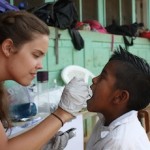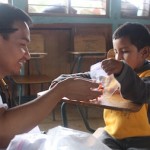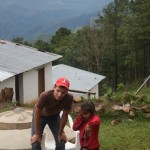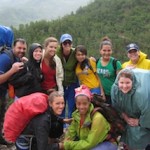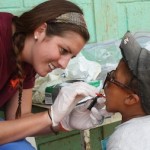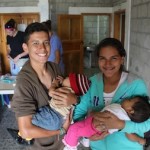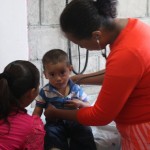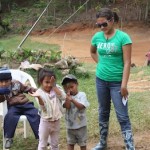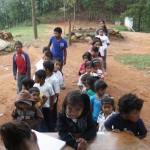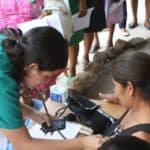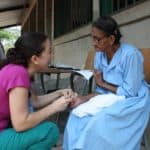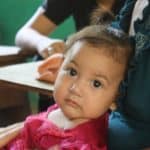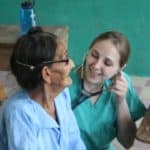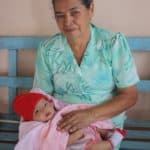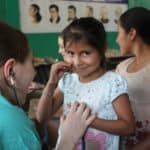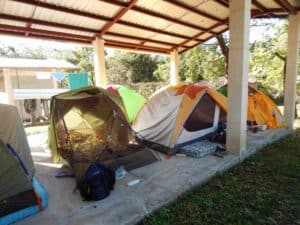
November 22, 2014
She hasn’t had a good night sleep since coming to Honduras. It isn’t sleeping in a tent on a concrete floor under the stars. The tent, after all, is placed over a semi soft mattress. It’s not the time change, only an hour’s difference. The tropical warmth doesn’t seem to bother her, even though she does live in Wyoming and it is mid-November. Those squirmy and crawly things are close by, but she’s not the type to jump up on a chair at the threat of a mouse. What is it then that keeps her awake half the night? She had once been told, and always believed it to be true, that roosters only crow to greet the sunrise. Actually, and this is not scientifically proven, roosters crow because they abhor silence, beginning their wrenching screams sometime around midnight and only slowing down sometime after dawn. Unfortunately, here in the frontier region of Intibucá, in the small village of Agua Salada, this tone-deaf choir outnumbers the human population by at least three to one.
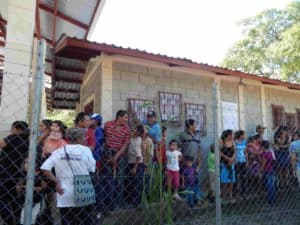
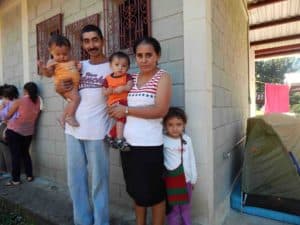
On Tuesday she is dragging a little bit. Perhaps that’s why the brigade leaders have given her light duty, fitting and distributing reading glasses. Still, when it’s real slow, she might be asked to assist with an injection or minor surgery. On occasion the pharmacy gets busy and she’s called over to fill prescriptions. On Monday, one of the leaders guessed that they saw about 120 patients. Perhaps everyone had shown up on the first day, but on Tuesday there are actually more. The word must be traveling to the more outlying districts. Whether tomorrow will bring more, or whether it might start to wane, no one is sure. But hundreds come, lined up for hours, to see one of the four doctors available; to get a diagnosis, a prognosis, a word of assurance and comfort sometimes in broken Spanish and sometimes via translators, a medication, a treatment, and some relief.
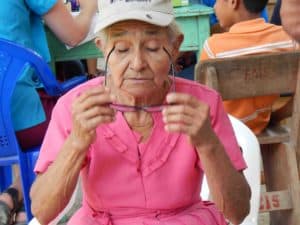
If that is all the Wyoming Brigade does, it’s certainly a great deal. But the generosity extends beyond the clinic and into the homes and lives of the residents of Agua Salada. They came with hygiene supplies. They came with school supplies. They now provide school scholarships for five local children and look to provide more. This is not simply about a generous gift, but rather it is about the commitment of relationship. The University of Wyoming partners with the community of Agua Salada and Shoulder to Shoulder such that enrichment, development, transformation, and meaningful growth are deeply rooted into the hearts of all involved: brigade members, beneficiaries, community leaders, and all who are committed to the relationship.
Later in the day when the lines are receding, the young nursing student who hasn’t gotten much sleep due to the rude roosters, might have slipped away to grab an hour or two siesta. She doesn’t speak Spanish, but all day long she’s been using the international language of play with children. I spy her now with two girls, maybe seven and eight years old. They are fully engrossed in a game of “patty cake” — mimicking, mirroring, and hand slapping. The smiles on their three faces, the sign of commitment and love, are the most powerful medicine that the University of Wyoming has distributed all day.
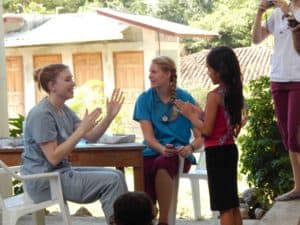
Brigade Update: VCU
Between June 11 and 22, a medical brigade from Virginia Commonwealth University joined Shoulder to Shoulder in the Pinares area of San Marcos de la Sierra. Since 2006, VCU has regularly visited this area. They visit three times annually, and generally include medical students, family medicine residents, and family medicine faculty. Over the years, they have brought dentists, sociologists, pharmacists, nurses, public health workers, and interpreters with them.
For two weeks, this group of physicians, medical students, pharmacists and PharmD candidates, MPH candidates, nurses, a paramedic, and student-translators from the bilingual school in La Ceiba engaged the community in the established Children’s Health Initiative (CHI) at local schools and treated patients at the Pinares clinic. The brigade also took in the U.S.A.-Honduras World Cup qualifer event, crowding into a small pulperia with most of the local community to watch the game. Aside from a few bruised egos, the American win did not cause any international incidents.
Every day, the brigade split into two teams. One group treated patients at the Pinares clinic, treating farming injuries, providing prenatal check-ups, pregnancy exams, and more. The CHI group hiked to a different school each day and set up health stations to address all areas of the children’s health. These included measuring height and weight, taking their hemoglobin, eye exams, fluoride rinses, and visits with physicians.
During one home visit, the brigade examined a 31-year-old patient who had been experiencing abdominal pain. The man had not eaten or drank anything for over a day, and hadn’t moved in two days. Entering the darkened home, the brigade was greeted by a prayer group who had been standing vigil over the sick man all day. The brigade members evaluated the man and determined he needed hospital treatment. As a team, the brigade carried the patient up the steep slopes to the road and drove him to the hospital.
The Pinares and outer communities in San Marcos de la Sierra are very remote and mountainous. Away from the main road to La Esperanza, many locals must walk for hours to receive medical attention. VCU’s CHI group enabled them to evaluate and treat a large volume of geographically diverse group of needy children in the schools. Throughout the year, Shoulder to Shoulder’s health promoters and home health medical teams visit these remote communities and homes to ensure that children, elderly, pregnant, and high-risk patients are receiving the attention they deserve.
Thank you to VCU for your tremendous team effort and support of the Pinares and San Marcos de la Sierra communities!
Brigade Update: Johns Hopkins
Led by Dr. Ed Zuroweste, Drs. Laurel Pellegrino, Lila Worden, Brett Wanamaker, three Johns Hopkins fourth-year residents, Dr. Mish Mizrahi, a family practice attending physician from UCLA, and Mike Piorunski, an Environmental and Occupational Health Program Associate with the Migrant Clinicians Network, the Johns Hopkins brigade spent two weeks immersed in the daily healthcare needs of the Santa Lucia area.
Accompanied by our nurses and Social Service doctors, they visited some of our most remote clinics and communities. While some students attended patients in our traditional field clinics, others assisted with the vaccinations. Dr. Pellegrino, who will begin her Psychiatry residency in July, had the opportunity to see patients in her field at the Santa Lucia clinic. Brigade members conducted home visits and gave charlas, or health education talks, to hypertensive, diabetic, and pregnant patients. Both the students’ and the audience’s favorite tool, by far, was a sugar-filled zip-lock bag demonstrating the actual amount of sugar in one bottle of Coke.
In their off-time, the brigade forded the Rio Torola, toured the La Esperanza hospital, and played a lot of Catchphrase. This group was open to experiencing everything from grunt work to taking night call and really went above and beyond in filling out our government paperwork. Thank you to Johns Hopkins and Dr. Zuroweste for your continued support, and for the brigade members’ tireless efforts on the ground in Intibucá.
For more photos from the brigade, check our Facebook page.


